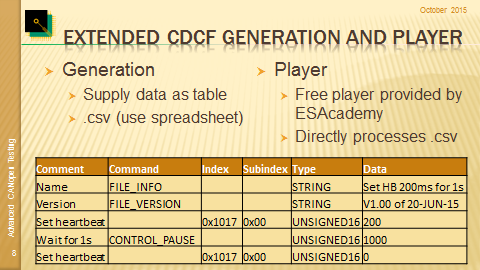Free CANopen Configuration and Test Utility
At today’s 15th international CAN conference Olaf Pfeiffer of Embedded Systems Academy presented a paper about testing of highly dynamic CANopen systems. Such systems support plug-and-play and node ID assignment by LSS (Layer Setting Services, node ID gets assigned through the network). As a result, devices may change their node ID, making tests more challenging.
One of the test utilities introduced in this paper is now available as free download from ESAcademy’s web pages. It supports the extended concise DCF (Device Configuration File) as introduced in the paper. It allows you to easily write down configuration or test sequences in a table (save as .csv) and execute them using the free CANopen File Player.
The file format, the concise Default Configuration File is part of the basic CANopen definitions and has been in use for quite some time. The extension to it is simply a definition of a set of commands introducing the option to control things like addressing specific devices (identify by CANopen Identity record 1018h) and time delays / timeouts or user interactions.
In addition, the utility can re-play previously made CAN trace recordings, supporting a wide variety of formats from Vector, PEAK and others.
For more information on the format of the extended CDCF see the manual or download the free utility.
 Deutsch
Deutsch English
English

 Learn about our current product range for embedded systems
Learn about our current product range for embedded systems


 Embedded Networking with CAN and CANopen. Your technology guide for implementing CANopen devices.
Embedded Networking with CAN and CANopen. Your technology guide for implementing CANopen devices. Implementing scalable CAN security. Authentication and encryption for higher layer protocols, CAN and CAN-FD
Implementing scalable CAN security. Authentication and encryption for higher layer protocols, CAN and CAN-FD